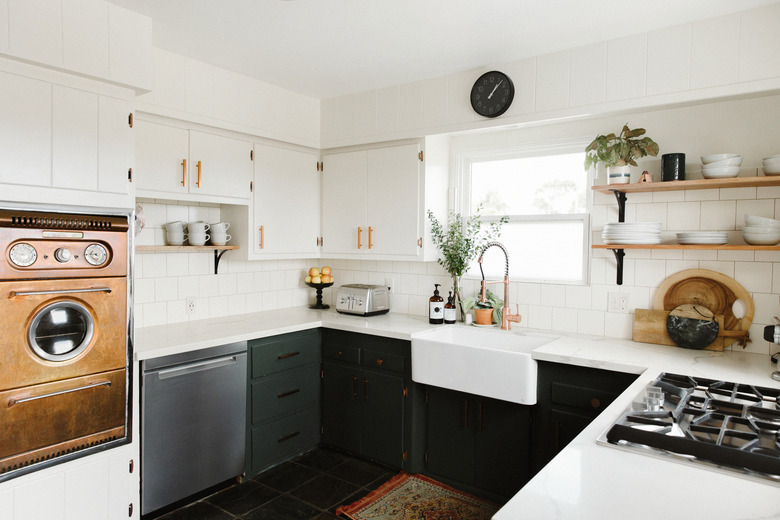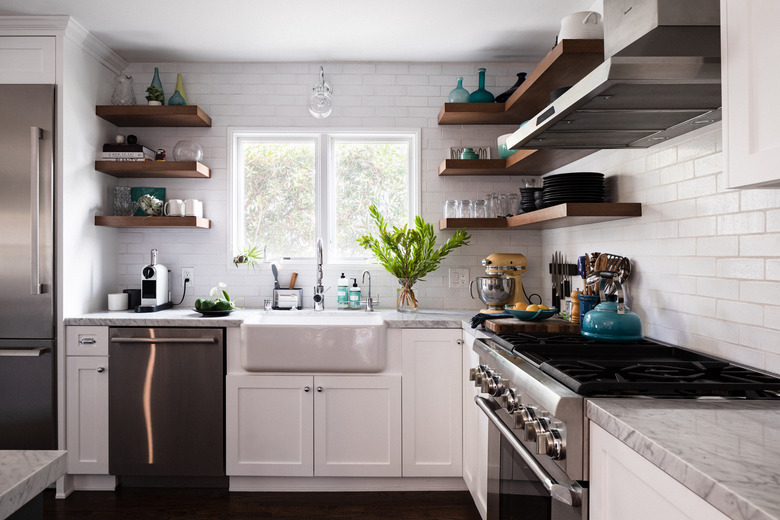Hiring A Kitchen Remodeling Contractor: A How-To Guide
After scrimping and saving for years to afford a new kitchen, it is finally time to dig in and get the kitchen remodeling underway. This is an exciting time, but it is important that you find a bit more patience and take the time to hire only the best remodelers. A bad contractor can quickly turn your dream kitchen into a nightmare, so it is critical to choose wisely.
Picking the right contractor may seem like a daunting task, but it is actually fairly easy when you know how. The first rule is to always trust your gut. If someone seems shady, they probably are. Once someone passes the gut check, however, there is a series of much more methodical and objective ways to evaluate potential remodelers.
Know What You Need
Know What You Need
If you are going for broke and completely revamping your kitchen, a general contractor is your best bet. You can also consider hiring a kitchen remodeling company that focuses only on kitchen renovation. Depending on the scope of your remodeling project, however, you may want to consider a specialist.
If, for example, you are happy with most of your kitchen but want new countertops, seek out a countertop fabricator/installer. The same holds true for new custom cabinets or flooring. If you are only changing one or two aspects of your kitchen, consider a contractor whose focus is on the areas you want to change.
Make a Remodeling Contractors List
Make a Remodeling Contractors List
Once you decide what kind of remodeling services you want, make a short list of potential installers. Start by talking to trusted friends, family members, neighbors and co-workers to see if they can recommend anyone. Remember to check websites like HomeAdvisor and Angie's List for recommendations.
After gathering a few names, start digging. Check each contractor's company website to read reviews and see what credentials they have. If your state requires a contractors' license, most contractors will post their license number and professional affiliations right on their website. Read as many reviews of the contractor as you can find and check their ratings with your local Better Business Bureau. Using the reviews and information you find, narrow down your list to a few home improvement companies or contractors to whom you'd like to talk based on the information you have gathered
Now that you have narrowed the field a bit, it is time to trim it further. Call the companies you have chosen on the telephone and ask them some preliminary questions. Find out how long they have been in business, how many kitchen projects they have handled in the last year and what types of insurance they have.
Find out what kind of payment terms the contractor offers and what brands of materials the company uses. Ask if the company is willing to provide references and show you a project on which they are currently working. If you don't have a professional design already, find out if the contracting company has professional kitchen designers on staff to help you formulate the best plan for your custom kitchen.
Once you have talked to a few contractors on the phone, choose three that you would like to ask for estimates. Kitchen Magic and other experts recommend getting only three estimates, as getting more can simply confuse the process and can make choosing one more difficult.
Get Some Estimates
Get Some Estimates
Call the three contractors you have picked and schedule a time for them to come and look at your kitchen. In order to give you the most accurate estimate possible, expect the contractor to take some measurements and ask you lots of questions while visiting. Although they should answer your questions thoroughly, a good home improvement contractor will also do a lot of listening so they can determine exactly what you want.
If there are some features you know you can't live without, make sure you tell your contractor while they are at your home. Have you fallen in love with a certain faucet or backsplash? Do you desperately want a kitchen island or a built-in dishwasher? Tell your potential kitchen remodeling contractors and give them pictures, part numbers and any other details that you can share. This will help make your estimate more accurate.
While getting your estimate, ask for references and a chance to look at a current project. This gives you time to check the references while the contractor prepares the estimate over the next few days.
Check the References
Check the References
Unfortunately, many homeowners ask home improvement companies for references but never get around to actually checking them. It is important that you do not skip this crucial step. It can tell you a lot about a contractor before you hire them. A few things to ask include:
- Did the company's workers keep their work area neat and clean up after themselves?
- Were work crews on time and respectful of your home?
- Was the craftsmanship satisfactory?
- How easily were any issues resolved?
- Was the work completed on schedule?
It is also important to ask when the reference's home renovation was completed. Contractors are only as good as their recent work. A company that did excellent work five years ago might not be so great today. Make sure your contractor isn't giving you old references from a better time in the company's history.
Making the Choice
Making the Choice
After checking the references, compare the estimates you received. Remember to look closely at the details. One estimate, for example, may be slightly higher but might include a better brand of new appliances. Another may recommend refinishing old cabinets rather than installing new cabinets. Choose a contractor who provides a lot of detail in the estimate, seems to best understand what you want and offers a fair price.
Remember, though, that nothing is carved in stone until you sign on the dotted line. Once you have picked the best kitchen remodeler for your job, hiring them will involve drafting a contract. Make the contract as detailed as possible so you both know what to expect.
The contract should clearly outline the payment terms, the scope of the work and the details of your home remodeling project. Check that it includes all of the following:
- Contact information for the company
- The remodel start and end date as well as any penalties for late completion if applicable
- A list of all the required materials and the choices you made about colors and finishes
- How conflicts and changes are to be handled
- Names of any subcontractors your general contractor will hire for drywall, cabinetry, countertops and other specialty installations
- Warranty information
- A broom clause that details who will clean up any unforeseen problems like broken plumbing pipes
- A termination clause stating who can end the contract and under what circumstances.
Make Yourself Available
Make Yourself Available
The hard part may be over once you have hired your contractor, but your work isn't done. It is important that you do what you can to help your kitchen remodel go smoothly. If you're not giving your contractor a key, make sure you're home to let the work crew in as scheduled. It is also important to make yourself available to answer any questions that come up during the project.
You may also have more decisions to make. Things come up during renovation work that sometimes alter the plan. It is possible, for instance, that the floor tile you picked was discontinued, and you'll have to choose a new one. Perhaps building codes prohibit putting the new stove exactly where you wanted it.
While it is important to make sure you are getting what you want for your money, understand that some of the snags your remodel may hit won't be anyone's fault. Stand firm on the things that really matter to you but choose your battles carefully, understanding that some changes are unavoidable.
Give Respect to Get Respect
Give Respect to Get Respect
Work crews sent to your home to remodel your kitchen are there to do a job. They are not guests. You certainly don't need to turn down a bed for them or invite them to stay for dinner. It never hurts, however, to endear yourself to them a little.
Make sure you say good morning and good night rather than ignoring workers like they're household servants. Let the crew use your bathroom when nature calls, as they're going to be at your house for a long time. Offering the occasional morning coffee and doughnuts doesn't hurt either.
A professional work crew will do the job to the best of their ability no matter what. We are all a little more willing to go the extra mile for someone we like, however, so feel free to grease the wheels a little bit with the crew assigned to your kitchen. Don't hover, however, as it slows down the work when the crew must work around you.
Red Flags and Issues
Red Flags and Issues
Unfortunately, bad kitchen remodeling contractors do exist, so you need to know how to spot them. If a contractor ever asks you to pay cash for a job or pay in full before the job is done, run the other way as fast as you can. Be suspicious of extremely low estimates as well. Some variation among estimates is normal, but if one company comes in significantly lower than the others with no obvious reason, something probably isn't right.
Surprisingly, prompt scheduling of your project can also serve as a red flag. You are probably excited to get started on your kitchen as soon as possible, but good contractors get booked quickly. If a contractor can start next week, ask yourself why.
Avoid inexperienced contractors as well. Kitchens and bathrooms require a contractor who can handle plumbing and electrical as well as appliance installations. Someone who usually waterproofs basements or installs hardwood living room floors may not have all the skills a kitchen requires even if they are fantastic at other things.




